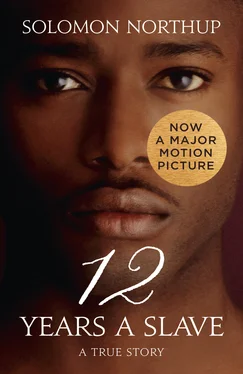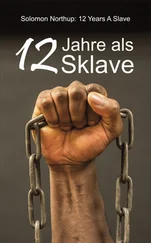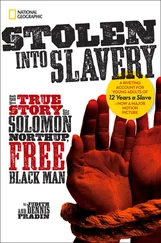The very amiable, pious-hearted Mr. Theophilus Freeman, partner or consignee of James H. Burch, and keeper of the slave pen in New Orleans, was out among his animals early in the morning. With an occasional kick of the older men and women, and many a sharp crack of the whip about the ears of the younger slaves, it was not long before they were all astir, and wide awake. Mr. Theophilus Freeman bustled about in a very industrious manner, getting his property ready for the sales-room, intending, no doubt, to do that day a rousing business.
In the first place we were required to wash thoroughly, and those with beards, to shave. We were then furnished with a new suit each, cheap, but clean. The men had hat, coat, shirt, pants and shoes; the women frocks of calico, and handkerchiefs to bind about their heads. We were now conducted into a large room in the front part of the building to which the yard was attached, in order to be properly trained, before the admission of customers. The men were arranged on one side of the room, the women on the other. The tallest was placed at the head of the row, then the next tallest, and so on in the order of their respective heights. Emily was at the foot of the line of women. Freeman charged us to remember our places; exhorted us to appear smart and lively—sometimes threatening, and again, holding out various inducements. During the day he exercised us in the art of “looking smart,” and of moving to our places with exact precision.
After being fed, in the afternoon, we were again paraded and made to dance. Bob, a colored boy, who had some time belonged to Freeman, played on the violin. Standing near him, I made bold to inquire if he could play the “Virginia Reel.” He answered he could not, and asked me if I could play. Replying in the affirmative, he handed me the violin. I struck up a tune, and finished it. Freeman ordered me to continue playing, and seemed well pleased, telling Bob that I far excelled him—a remark that seemed to grieve my musical companion very much.
Next day many customers called to examine Freeman’s “new lot.” The latter gentleman was very loquacious, dwelling at much length upon our several good points and qualities. He would make us hold up our heads, walk briskly back and forth, while customers would feel of our hands and arms and bodies, turn us about, ask us what we could do, make us open our mouths and show our teeth, precisely as a jockey examines a horse which he is about to barter for or purchase. Sometimes a man or woman was taken back to the small house in the yard, stripped, and inspected more minutely. Scars upon a slave’s back were considered evidence of a rebellious or unruly spirit, and hurt his sale.
One old gentleman, who said he wanted a coachman, appeared to take a fancy to me. From his conversation with Freeman, I learned he was a resident in the city. I very much desired that he would buy me, because I conceived it would not be difficult to make my escape from New Orleans on some northern vessel. Freeman asked him fifteen hundred dollars for me. The old gentleman insisted it was too much, as times were very hard. Freeman, however, declared that I was sound and healthy, of a good constitution, and intelligent. He made it a point to enlarge upon my musical attainments. The old gentleman argued quite adroitly that there was nothing extraordinary about the nigger, and finally, to my regret, went out, saying he would call again. During the day, however, a number of sales were made. David and Caroline were purchased together by a Natchez planter. They left us, grinning broadly, and in the most happy state of mind, caused by the fact of their not being separated. Lethe was sold to a planter of Baton Rouge, her eyes flashing with anger as she was led away.
The same man also purchased Randall. The little fellow was made to jump, and run across the floor, and perform many other feats, exhibiting his activity and condition. All the time the trade was going on, Eliza was crying aloud, and wringing her hands. She besought the man not to buy him, unless he also bought herself and Emily. She promised, in that case, to be the most faithful slave that ever lived. The man answered that he could not afford it, and then Eliza burst into a paroxysm of grief, weeping plaintively. Freeman turned round to her, savagely, with his whip in his uplifted hand, ordering her to stop her noise, or he would flog her. He would not have such work—such snivelling; and unless she ceased that minute, he would take her to the yard and give her a hundred lashes. Yes, he would take the nonsense out of her pretty quick—if he didn’t, might he be d—d. Eliza shrunk before him, and tried to wipe away her tears, but it was all in vain. She wanted to be with her children, she said, the little time she had to live. All the frowns and threats of Freeman, could not wholly silence the afflicted mother. She kept on begging and beseeching them, most piteously, not to separate the three. Over and over again she told them how she loved her boy. A great many times she repeated her former promises how very faithful and obedient she would be; how hard she would labor day and night, to the last moment of her life, if he would only buy them all together. But it was of no avail; the man could not afford it. The bargain was agreed upon, and Randall must go alone. Then Eliza ran to him; embraced him passionately; kissed him again and again; told him to remember her—all the while her tears falling in the boy’s face like rain.
Freeman damned her, calling her a blubbering, bawling wench, and ordered her to go to her place, and behave herself, and be somebody. He swore he wouldn’t stand such stuff but a little longer. He would soon give her something to cry about, if she was not mighty careful, and that she might depend upon.
The planter from Baton Rouge, with his new purchases, was ready to depart.
“Don’t cry, mama. I will be a good boy. Don’t cry,” said Randall, looking back, as they passed out of the door.
What has become of the lad, God knows. It was a mournful scene indeed. I would have cried myself if I had dared.
That night, nearly all who came in on the brig Orleans , were taken ill. They complained of violent pain in the head and back. Little Emily—a thing unusual with her—cried constantly. In the morning a physician was called in, but was unable to determine the nature of our complaint. While examining me, and asking questions touching my symptoms, I gave it as my opinion that it was an attack of smallpox—mentioning the fact of Robert’s death as the reason of my belief. It might be so indeed, he thought, and he would send for the head physician of the hospital. Shortly, the head physician came—a small, light-haired man, whom they called Dr. Carr. He pronounced it smallpox, whereupon there was much alarm throughout the yard. Soon after Dr. Carr left, Eliza, Emmy, Harry and myself were put into a hack and driven to the hospital—a large white marble building, standing on the outskirts of the city. Harry and I were placed in a room in one of the upper stories. I became very sick. For three days I was entirely blind. While lying in this state one day, Bob came in, saying to Dr. Carr that Freeman had sent him over to inquire how we were getting on. Tell him, said the doctor, that Platt is very bad, but that if he survives until nine o’clock, he may recover.
I expected to die. Though there was little in the prospect before me worth living for, the near approach of death appalled me. I thought I could have been resigned to yield up my life in the bosom of my family, but to expire in the midst of strangers, under such circumstances, was a bitter reflection.
There were a great number in the hospital, of both sexes, and of all ages. In the rear of the building coffins were manufactured. When one died, the bell tolled—a signal to the undertaker to come and bear away the body to the potter’s field. Many times, each day and night, the tolling bell sent forth its melancholy voice, announcing another death. But my time had not yet come. The crisis having passed, I began to revive, and at the end of two weeks and two days, returned with Harry to the pen, bearing upon my face the effects of the malady, which to this day continues to disfigure it. Eliza and Emily were also brought back next day in a hack, and again were we paraded in the sales-room, for the inspection and examination of purchasers. I still indulged the hope that the old gentleman in search of a coachman would call again, as he had promised, and purchase me. In that event I felt an abiding confidence that I would soon regain my liberty. Customer after customer entered, but the old gentleman never made his appearance.
Читать дальше












